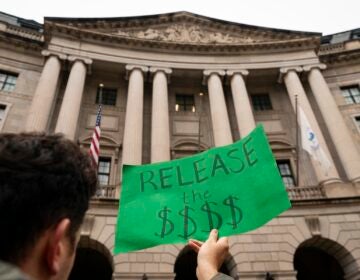Business leaders fear climate-change regulations will add to costs, stunt growth
But DEP official says new rules will be about economic development as much as environmental protection.

DEP Commissioner Catherine McCabe has set deadlines of up to two years for the department to propose regulations. (Bernd Klutsch/Unsplash)
This article originally appeared on NJ Spotlight.
–
An upcoming cascade of new state regulations to respond to climate change is causing trepidation in the business community even before being issued by the state Department of Environmental Protection, business leaders said.
Spokespeople for the New Jersey Chamber of Commerce and the New Jersey Business & Industry Association said yesterday that their members know little about the regulations that will implement Gov. Phil Murphy’s recently updated Energy Master Plan (EMP), but fear that they will impose onerous burdens on companies as part of what Murphy called “the most sweeping set of climate regulations in the country.”
“The fear is probably more than what we know,” said Ray Cantor, vice president of government affairs for the association. “The EMP really didn’t take into account any of the comments that business groups offered, and then [Gov. Murphy] signed the Executive Order the same day with very vague language that said DEP shall change its air, land-use and other regulations to take into account climate change. That’s all we know.”
Shawn LaTourette, DEP chief of staff, said the EMP process was conducted by the Board of Public Utilities, which included business representatives in its discussions. Now, DEP will oversee the regulatory process, and the agency wants to hear from all stakeholders, including the business community.
“We’re at the beginning of the next chapter, and we’re inviting the business community to come with us in writing the next chapter,” LaTourette said in an interview with NJ Spotlight. “We’re going to be with them shoulder to shoulder, just like we are with local governments and our partners in the advocacy community because we are really all in this together.”
DEP to seek public input
On Thursday, DEP announced three daylong public meetings in the coming weeks to seek input from businesses and other stakeholders, such as residents and advocacy groups, on how to write regulations on land use, the reduction of carbon emissions, and adaptation to climate-change impacts such as sea-level rise.
The meetings, in late February and early March, will focus on monitoring greenhouse gases, cutting carbon emissions, and better planning for sea-level rise, storms and flooding.
On Jan. 27, DEP Commissioner Catherine McCabe set deadlines of up to two years for the department to propose regulations on reducing greenhouse gas emissions; setting up a monitoring and reporting program for the gases; incorporating climate-change considerations into existing rules governing wetlands, flood zones and stormwater management, and making sure that climate change is part of DEP’s grant, loan and contracting programs.
Within 60 days of the order, officials are also required to issue guidance on sea-level rise, and recommend adaptations that should become part of the planning process.
In the interview, LaTourette said the business groups’ concerns may reflect their unhappiness with the modeling of climate-change effects during the EMP process, rather than any exclusion from it. “It’s the difference between not being invited to the conversation, which they were, and not liking the outcome of the modeling, which is really their position,” he said.
‘False dichotomy’
The regulations that will come out of the new process will be as much about economic vitality as about environmental protection, LaTourette said. “We don’t believe in that false dichotomy that you can have a clean environment or economic development — those two things go hand in hand.”
Jane Cohen, a senior adviser to Murphy on environmental affairs, also said the EMP process included economic development.
“The Governor has been very clear that part of what he is looking at when formulating his policies around addressing climate change are exactly around economic development,” she said. “He really wants to support economic development through clean-energy policies.”
Still, business leaders expressed concern about what the regulations might contain.
For example, a developer who wants to build a supermarket might have to calculate its impact on climate change, a requirement that would cause both confusion and expense, Cantor said.
While business groups will be represented at the upcoming meetings, they remain concerned that the new regulations will not be business-friendly.
Economic challenges
“What kind of challenges are we putting out to the economic drivers of the state?” said Michael Egenton, executive vice president of the chamber. “If there are going to be impediments about where people can build, and we’re the first state out of the gate to do this, that could work against us.
“In the business community, of course we have to be concerned. This is a major change going forward that they want to implement, but we want to have the opportunity to share our concerns with the agencies,” he said.
Despite their qualms, both business groups recognize the state’s need to plan for climate change, and to reduce carbon emissions as part of a global effort to slow the phenomenon, even if that means cutting back on development of coastal areas that are vulnerable to sea-level rise.
“I don’t think I run into many people who are climate change deniers anymore,” said Egenton. “The majority of people recognize that something is going on and with that, there is a recognition that economic development, particularly along the Jersey Shore, has to be handled in a special manner.”
For his part, Cantor said businesses fear that DEP will use its wide regulatory authority to impose overzealous regulations that are based on future projections but don’t reflect current realities.
“If the DEP, two years from now, starts trying to implement the highly speculative assumptions 30 years down the road, we could have energy chaos and economic chaos as a result,” he said.
Sea-level rise projections
But LaTourette said it’s critical to plan for future sea-level rise given projections that the ocean at the Jersey Shore will rise 2 feet by 2050 and 6 feet or more by the end of the century.
“We in New Jersey are uniquely vulnerable to sea-level rise — two times worse than the global average,” he said. “For us to ignore that, and to be backward-looking or current-looking is a betrayal of our oath to the residents of this state.”
The business community is especially concerned about any rule that would ban the use of natural gas, a fossil fuel that was initially hailed as a cleaner alternative to coal or oil, but which critics now say emits almost as much carbon as the other fuels after leaks of methane and fracking emissions are included.
“We embrace all forms of energy in NJ because we believe that if we’re going to grow the economy, we’re going to need that energy,” said Egenton. “We support nuclear and natural gas as well as wind and solar.”
One environmental group said DEP’s move to implement the EMP reflects an urgent need to act on climate change.
“We are pleased to see the NJ DEP moving quickly to implement the Governor’s executive order to protect against climate threats,” said Tom Gilbert, campaign director for the New Jersey Conservation Foundation and ReThink Energy NJ.
Pete Kasabach, executive director of New Jersey Future, a nonprofit that advocates for smart growth, said the regulatory process will begin overdue action by the state on climate change.
“We’ve been ignoring the impacts of climate change for a long time, and now the state is saying, ‘Listen, this is a really big deal for New Jersey and we don’t want to keep investing billions of dollars in private and public capital in places that are at risk,” he said. “So let’s understand that risk first, and then let’s change the way we make our investments.’”
WHYY is your source for fact-based, in-depth journalism and information. As a nonprofit organization, we rely on financial support from readers like you. Please give today.




